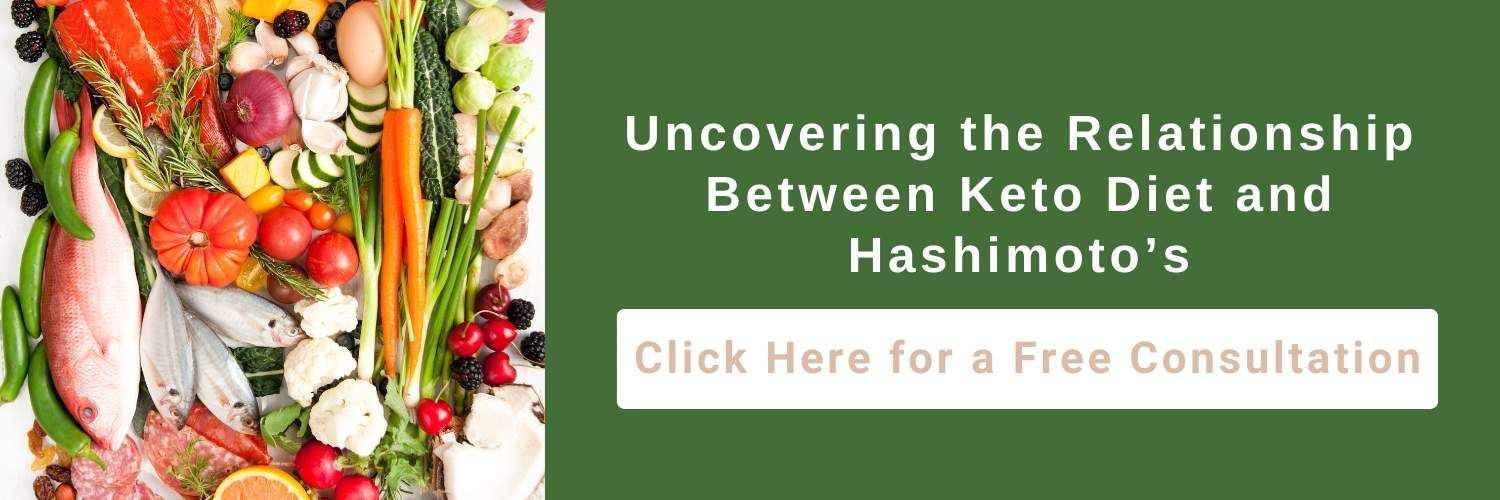Keto and Hashimoto’s Thyroiditis: Can a Low-Carb Diet Support Thyroid Health?
You’ve spent the last hour looking through all the health sites you could find. The doctor said losing weight may help alleviate Hashimoto's symptoms, but you have no idea which one to choose, or even where to start looking.
Your friends have all lost weight on the keto diet, but will it help your symptoms or make them worse? A million questions are driving in circles in your mind, and you’re not sure where to turn.
This article’s a good place to start.
Keep reading to learn what keto is, the pros and cons of following it, and what other Hashimoto-friendly options are out there.
Table of Contents
Understanding Hashimoto’s Thyroiditis
Hashimoto’s thyroiditis is an autoimmune disease that causes your body’s immune system to attack your own thyroid gland, interrupting the process of producing necessary thyroid hormones. When it produces less of the hormone, you may develop hypothyroidism.
Common symptoms of Hashimoto’s thyroiditis include:
- Fatigue
- Weight changes
- Brain fog
- Sluggish metabolism
- And more
If you’re suffering from Hashimoto’s thyroiditis or other forms of hypothyroidism, let HealthierU guide your nutrition to feel better faster. Dr. Donna Sergi is a holistic nutritionist specializing in women's health and wellness and has the experience it takes to set you on the road to recovery..
How Hashimoto’s Affects the Body
Hashimoto’s may have a severe impact on your metabolism, causing you to struggle with your weight and lagging energy levels. It may also be a contributing factor to things like:
- High cholesterol levels
- Heart complications
- Hypertension
- Myxedema
What Exactly Is the Keto Diet?
The traditional keto diet follows the concept of high-fat combined with very-low-carb, limiting daily carbohydrate consumption to 15g. However, the limit threshold varies for different groups of people and their metabolic rates. It’s important to discuss your dietary needs and options with a licensed nutritional health professional, like HealthierU.
Many have found the keto diet easier to follow than others because the high amount of healthy fats tends to keep them satiated for longer. Followers are instructed to eat high-fat foods, such as oils, fish, avocado, eggs, cheese, specific types of meats, nuts, and seeds. Non-starchy vegetables and limited amounts of lime, lemons, and berries are allowed.
How the Keto Diet Works
The keto diet is thought to cause your body to enter ketosis, a fat-burning state where the energy needed for body functions is pulled from food or from within your own fat cell storage.
Your body’s first source of fuel is typically glucose derived from sugar and carbohydrates, but when those aren’t available, it relies on stored fat. The ketosis state generally happens two to four days after you’ve consumed 20g-50g of carbs every day.
People following the keto diet may report improved energy and better focus. Your body may become more metabolically stable with smoother and more efficient energy delivery to the brain and muscles, unlike relying on carbs, which burn out quickly, causing energy and focus crashes.
Hashimoto’s and Keto Diet: The Pros and Cons
Since low-carb diets may influence thyroid function, inflammation, and metabolism, there are mixed views in the nutrition sphere concerning the keto diet and Hashimoto’s.
For some, it may be beneficial, but for others, it may do more harm than good. It’s important to discuss appropriate diet options with your
holistic nutritionist before making any drastic changes to your eating habits.
Potential Benefits for Hashimoto’s
Individuals diagnosed with Hashimoto’s may see some benefits from following a low-carb diet like keto. Positive responses may include:
- Reduced oxidative stress – Because
hypothyroidism caused by Hashimoto’s is an increased state of oxidized stress, following the ketogenic diet may reduce the amount of stress on your body. Your thyroid function may normalize due to that decrease.
- Blood sugar balance –
Keto can affect
blood sugar. Keeping your blood sugar and insulin levels stable may also reduce
oxidative stress that may negatively affect your organs and body systems. If your blood sugar is balanced, your body will not need to produce or overproduce insulin, whose spikes may lead to low blood sugar.
- Reduced inflammation by limiting processed carbs –
By following the keto diet, you’ll likely focus on eating a lot of anti-inflammatory foods, possibly reducing the amount of inflammation in the body, which in turn may help to alleviate hypothyroidism symptoms.
- Possible support for weight management – Staying away from refined carbs and sugar prevents the production of glucose, your body’s first choice for fuel. When there is no glucose, your body is forced to get its energy from your fat stores. Because your body will be consuming fat, you’ll likely lose weight. Fat tissue may cause inflammation, so by burning your fat reserves, your body will have fewer sources to pull from to cause inflammation.
Potential Risks and Concerns
- Thyroid hormone conversion – Following a strict low-carb diet like keto may cause a reduction in the necessary enzymes that convert T4 to T3. When the active T3 conversion stops, it could cause the production of reverse T3 and T4, which reduces overall thyroid efficiency. A lack of necessary carbs may send your body into survival mode, causing it to conserve energy by lowering active thyroid hormone levels. Too few carbs may raise your cortisol levels, suppressing TSH and reducing deiodinase enzymes needed to convert T4 to T3.
- Nutrient deficiencies
– Many keto diet followers rely heavily on meats and fats and mostly avoid vegetables, leading to the loss of critical nutrients needed for proper gut and thyroid health.
Avoiding dairy, seaweed, fish, and iodized salt may reduce the iodine needed for thyroid hormone synthesis. Limiting nuts, seeds, and vegetables may reduce selenium intake, essential for protecting thyroid tissue and T4 to T3 conversion. There’s also likely a drop in fiber intake — slowing digestion, weakening gut health, and disrupting the gut microbiome.
- Fatigue and low energy – Low motivation, sluggishness, and fatigue may all be worsened due to decreased T3 production and missing nutrients. Your body may go into survival mode when carbs are cut too low to prevent starvation, leading to possible exhaustion and cold intolerance. At the start of a keto diet, you may feel dizzy, have low blood pressure, or experience fatigue because your body loses a significant amount of water and sodium rapidly. Significantly low levels of iodine, selenium, magnesium, B vitamins, and iron may all lead to tiredness and a weakened metabolism.
Considerations Before Starting Keto With Hashimoto’s
There is no one-size-fits-all diet solution for anyone, including those with Hashimoto’s. Personalization is key to finding the right one for you that can fit easily into your lifestyle, and you are likely to stick to. What some people find sustainable may not work for others.
Nutrients That Matter
There are several key nutrients that may be required for optimal thyroid function:
- Selenium
– Often found in foods like fatty fish, turkey, and eggs, selenium is essential for converting T4 into active T3 and for protecting the thyroid gland from oxidative stress and inflammation.
- Zinc – The mineral may support thyroid hormone
production and provide balance in theimmune system. A zinc deficiency, however, may worsen common Hashimoto’s symptoms — such as hair loss and rate of healing. You can find zinc in oysters, beef, pumpkin seeds, chicken, and cashews.
- Vitamin D – This vitamin may help
regulate the overactive immune system, which is often common in autoimmune diseases like Hashimoto’s.
Vitamin Dlevels are often lower in people with thyroid disorders. You can increase your vitamin D intake by getting more direct sunlight exposure, eating fatty fish (like sardines, mackerel, and salmon), and drinking both fortified dairy and nondairy milk.
- Iodine – Iodine is important for thyroid hormone production, but it should be taken with caution. Taking too much iodine may cause autoimmune inflammation flare-ups and worsen symptoms. You can find iodine naturally in seaweed (nori, kelp, and wakame), fish, eggs, and iodized salt.
Listening to Your Body
Your body knows what’s best for it.
Keep a simple journal or notes app to record changes in your mood, weight, energy, and sleep. Pay the most attention to things like hair loss, cold intolerance, brain fog, and fatigue.
Monitor your labs to notice any variations in your TSH, free T4, free T3, and thyroid antibodies, especially after you’ve changed your eating habits. If they aren’t improving or are getting worse, keto might not be your best option.
Meet with your nutritionist regularly to address any concerns and make adjustments to your diet as needed.

Alternatives to Keto for Thyroid Health
If it seems like keto isn’t working for you, here are a few alternative diets to try:
- Mediterranean diet – This diet focuses on eating:
- Whole, minimally or non-processed foods
- Leafy greens
- Lots of vegetables
- Fruits
- Legumes
- Olive oil
- Fish
- Lean meats
- Nuts
- Seeds
There’s
increasing evidence suggesting this diet may support a healthy gut microbiome, which may help with autoimmune thyroid disorders.
- Autoimmune Paleo/AIP (Autoimmune Protocol)
– A diet like this is best used as a short-term diagnostic elimination diet to discover what foods a person may have an allergy to or an intolerance of. It initially eliminates common food triggers like gluten, dairy, eggs, nuts, and nightshades, then reintroduces them one at a time.
- Mediterranean + targeted modifications
– This hybrid approach combines the two diets listed above — the Mediterranean eating style, but with adjustments made for any food sensitivities. This is less likely to cause extra stress on the thyroid and offers more flexibility in what you can eat.
- Gut health – Having diverse good bacteria in your gut — a healthy microbiome — is essential to thyroid and immune function. By including fiber-rich vegetables, probiotic and fermented foods like Greek yogurt, kefir, and sauerkraut in your diet, you’re encouraging your gut to moderate inflammation and regulate your immune system signaling. Poor gut health may prevent proper nutrient absorption.
Frequently Asked Questions About the Keto Diet and Hashimoto’s
Can the Keto Diet Cure Hashimoto’s?
No diet in the world can cure Hashimoto’s. The main goal is to actively manage your symptoms and work to reduce inflammation through healthy nutrition and lifestyle changes.
Is Keto Safe for People With Hypothyroidism?
It varies from person to person. It can be safe for some, but it may worsen symptoms in others. Close monitoring with a nutrition professional, like HealthierU, is essential.
What Foods Should I Avoid With Hashimoto’s?
To avoid probable inflammation increases, you’ll want to eliminate:
- Highly processed foods
- Refined sugars and flours
- Gluten (particularly if you have Celiac or a gluten allergy)
- Excess dairy
Do Carbs Help Thyroid Function?
Yes. Thyroid hormone conversion may require adequate carbohydrate support. Ultra-low-carb diets may hinder some people with Hashimoto’s.
What Is the Best Diet for Hashimoto’s Thyroiditis?
The most effective diet is a Mediterranean-style diet or one rich in healthy fats, lean meats, vegetables, and moderate carbs. It should focus on whole foods rather than processed ones.
You can include complex carbs from vegetables and fruits, and small amounts of gluten-free grains and legumes. Be sure to add fiber-rich vegetables and fermented or probiotic foods to support your gut health and keep a healthy microbiome.
Ultimately, the most important part of your diet is finding one that is sustainable for your lifestyle.
Find Support for Your Thyroid Health With Individualized Care From HealthierU
You don’t have to deal with Hashimoto’s thyroiditis alone.
HealthierU has the support, tools, and nutritional expertise you need to tackle your diagnosis and start feeling better more quickly. Through specialized testing and one-on-one sessions, we’ll determine your allergies, intolerances, and deficiencies, and create a personalized diet and supplement plan to help you on the road to a healthier you.
Contact HealthierU today to get started.




